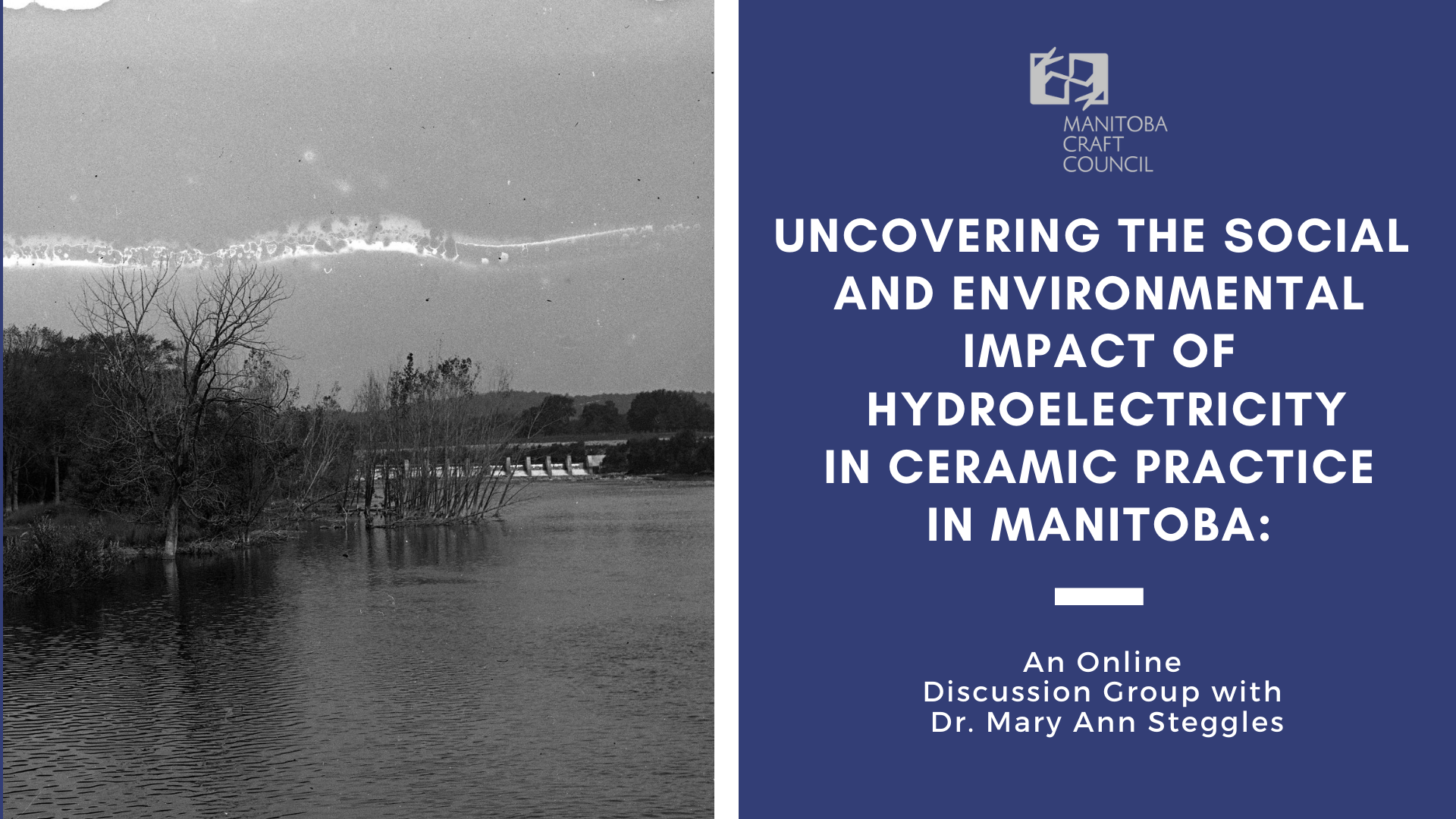Uncovering the Social and Environmental Impact of Hydroelectricity in Ceramic Practice in Manitoba
An Online Discussion Group led by Dr. Mary Ann Steggles
With visiting contributors KC Adams and Will Braun.
Tuesday evenings, 7-8:30 pm
October 13, 20, 27, & November 3, 2020
Sessions will take place via Zoom
Registration open until October 6, 2020
Participants must attend all 4 sessions.
Max 10 participants
Registration is free
Focus
The focus is on discovering the social and environmental impact of hydroelectricity in ceramic practice in Manitoba.
Contributors
KC Adams is a Winnipeg-based artist who graduated from Concordia University with a B.F.A in studio arts. Adams has had several solo exhibitions, group exhibitions and been in three biennales including the PHOTOQUAI: Biennale des images du monde in Paris, France. Adams participated in residencies at the Banff Centre, the Confederation Art Centre in Charlottetown, the National Museum of the American Indian and the Parramatta Arts Gallery in Australia. Her work is in many permanent collections Nationally and Internationally. Twenty pieces from the Cyborg Hybrid series are in the permanent collection of the National Art Gallery in Ottawa and four trees from Birch Bark Ltd, are in the collection of the Canadian Consulate of Australia, NSW. She was the scenic designer for the Royal Winnipeg Ballet’s Going Home Star: Truth and Reconciliation. She helped design a 30-foot public art sculpture called Niimamaa for the Winnipeg Forks and a piece for the United Way of Winnipeg called Community. Adams was awarded the Winnipeg Arts Council’s Making A Mark Award and Canada’s Senate 150 medal recipient for her accomplishments with her Perception Photo Series. KC is now an author with her book Perception: A Photo Series that Quill & Quire. chose as 2019 Books of the Year.
Will Braun has done research, advocacy and writing related to impacts of the hydropower system in northern Manitoba for much of the past 20 years. He currently works for two hydro-impacted First Nations. Will lives on a small farm south of Morden with his family.
Mary Ann Steggles is a writer, a sometimes maker, a curator, and an environmentalist. For three decades she taught at Bishop’s University, Acadia University and the University of Manitoba after running a ceramic studio in southern Manitoba for nearly two decades. Her most recent book chapters include “Lessening the Carbon Footprint of Ceramics” in Making Eco Logical edited by Amanda White and Elysia French, Queen’s-McGill University Press; “Is Manitoba’s hydro really clean energy?” in Reinventing the City: Lessons in Urban Ecologyedited by Deborah Mutnick; and “The Vietnam Era Resisters Who Shaped Canada’s Ceramic Heritage’ in Morra, L., Louis-Georges, H. & Henzi, S. (Eds)., Untold Stories of the Past 150 Years, Wilfred Laurier University Press. Articles on contemporary ceramics appear regularly in Topferblatt, Studio Potter, Ceramics Monthly, Neue Keramik, and Ceramics Art and Perception.
Participants
Participants may be potters and ceramic artists at all levels, from beginners to well-established artists, as well as others with a strong interest in the subject matter.
Objectives
At the end of the discussion group, participants will have:
- engaged with other makers, at various stages of their career, to examine the role that hydro plays in their practice.
- listened to an indigenous artist and activist discuss the sacredness of Mother Earth and to an archeologist speak about how long fired ceramics live in the soil.
- learned from an indigenous individual precisely how mega-dam construction impacted their community in all its facets.
- read about the positive aspects of mega-dam construction in Manitoba as publicized by Manitoba Hydro.
- read and discussed the negative impact of mega-dam construction.
- found and discussed potential alternatives to creating electricity.
- a better understanding of how everything we do as makers impacts all aspects of the biosphere.
- their views integrated into a chapter titled, “Social Injustice: Manitoba Hydro’s Mega-Dams and Their Ethics in the Teaching of Ceramics and Sustainability” to be published in Routledge’s series on Sustainability and the Environment.
Expectations
Participants will:
- have a respectful and open-minded attitude.
- attend all four sessions.
- exhibit a sincere and thoughtful interaction with other discussion group members and invited guests.
- come prepared for the next discussion session by reading or watching any material posted.
- willingly engage in discussions with other members, equally sharing the “air time”.
- be willing to have statements quoted in a chapter for an upcoming book. [Names can be withheld on request].
- be willing to take part in a six month follow up conducted by the facilitator
Registration for this class has reached capacity. Please contact mccprogramming@c2centreforcraft.ca for wait list options. Our apologies and thank you!



